Palestine

Like any other Gen Zer, I’ve grown up hearing about the potential harms of social media: As early as elementary school, teachers and parents warned us of stranger danger, not just in the grocery store, but also online. I was 12 when I got my first social media account on Instagram (even though my hand-me-down iPod Touch didn’t have a camera). In seventh grade, I, and many of my classmates, wrote our final essays for English class on the influence of social media on teenage girls’ body image. I was in junior high when news broke that Facebook user data had been improperly harvested to manipulate U.S. voters. In my high school’s speech and debate club, I learned about dangers of doxxing — posting people’s personal information, like addresses, online as a way to target them for violence. And in my own work here at Sojourners, I regularly see the hate and homophobia that shows up in social media comments.
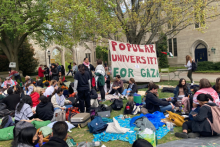
Just a short walk from my home near Princeton University, students, faculty, staff, and community members have come together to demand the university divest from financial and military support of the state of Israel and release a public statement calling for a ceasefire in Gaza — one of many similar protests that have been happening at college campuses across the U.S. over the past two weeks. Stroll by the encampment at any given time, and you’ll see folks of all ages and races gathered together on blankets and tarps sharing crowdfunded hot meals as scholars address the group; kids play and others offer physical and spiritual care, or clean up the encampment grounds. You might hear community announcements, prayer, music, or, at times, chants like “disclose, divest / we will not stop / we will not rest.”

Do you ever wonder if calling your representatives makes a difference? Do you ever wonder if prayer yields fruit? Considering all the injustice in the world, I think those are fair questions to ponder.
Since last October, I’ve spent many nights crouched over the bed with my phone on loudspeaker. I’ve been calling my representatives for the passing of H.R. 786, a congressional resolution that urges “an immediate deescalation and cease-fire in Israel and occupied Palestine.” This has been my daily practice.
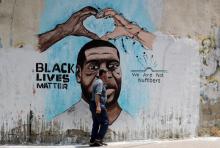
The story of Zion resonates with the history of African Americans. Blacks and Jews share common legacies of segregation, genocide, and racial domination. No wonder many enslaved Africans understood biblical Israel as a symbol of freedom from bondage. As historian Robin D.G. Kelley explains, the story of Exodus “provided Black people not only with a narrative of slavery, emancipation, and renewal, but with a language to critique America’s racist state.” Exodus was our political compass through the wilderness of slavery. Except we imagined ourselves as the Israelites, America as Egypt, and “Massa” as the Pharaoh whom freedom fighters like Nat Turner and Harriet “Moses” Tubman demanded, “Let my people go!”
But my view of Israel changed when I learned about Palestine in the streets of Ferguson, Mo.

In July of last year, an estimated 50,000 fans flooded Arrowhead Stadium in Kansas City to see Taylor Swift’s Eras Tour concert. Among those in the crowd was football tight end Travis Kelce, eager to woo Swift. Arrowhead has been central to Swift and Kelce’s romance ever since: After making their romance official last September, Swift has routinely joined the 76,000 Chiefs fans to cheer for Kelce and his teammates. From concertgoers to sports spectators, the thought of that many people in the same space is difficult to imagine. Equally hard to imagine, and significantly more heartbreaking, Israel Defense Forces have killed 25,000 Palestinians since Oct. 7, 2023; that number of people would fill about a third of Arrowhead Stadium.
This is a jarring image, but such is the reality of our present moment: While the state of Israel carries out a genocide against Palestinians, we are easily distracted by our adoration for Swift and Kelce, along with spectator sports.

“I have friends and family who lost people in the attack by Hamas on Oct. 7. I have colleagues and friends in Gaza who were bombed by the Israeli attack. I go to demonstrations against the genocide in Gaza because I want to be with others that shout and call for the immediate stop of this unforgivable crime. And I cannot chant all the chants in those demonstrations. I chant some of them.”
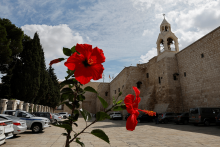
At a vigil for peace in Washington, D.C., this Tuesday, Palestinian Lutheran pastor Munther Isaac spoke about the approaching Christmas season in his home of Bethlehem in the West Bank.
“How can we celebrate when we feel this war — this genocide — that is taking place could resume at any moment?” he said.
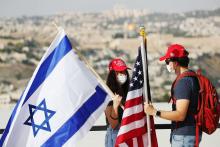
Like many across the world, the events in Israel and Palestine have had me glued to a wide variety of sources in search of live updates. My first reaction was to message my dear friends living in Israel-Palestine to check on them and their families’ safety: Sami, Mohammad, Jehad, Feras, Jack, Miriam, and Naama. My heart is tremendously heavy with the immense loss of precious life that has already unfolded and the dread for the violence still to come. I say this sorrowfully and without an ounce of callousness: This attack by Hamas, though sudden and horrific, did not come as a surprise to me.
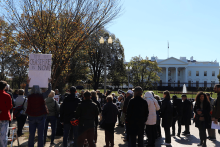
Fifty protesters gathered for a “pray-in” in Lafayette Square on Thursday afternoon, holding signs directly facing the White House that said, “Catholics say ceasefire now.”
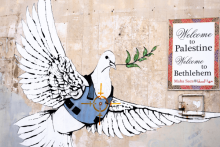
I have spent my life advocating for Palestinians and Israelis to use nonviolent means to resolve their conflicts. Because Israel feared Palestinian unity and mass nonviolent action, I was expelled by the government in 1988. Since then, I have, on several occasions, personally advocated with Hamas leaders to abandon armed struggle and embrace nonviolent campaigns. Yet, today, Palestinians and Israelis are once again killing each other.
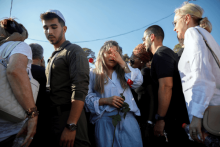
We all are shocked by Hamas’ horrific, inhumane attacks on the people of Israel, which killed more than 1,000 people, according to recent estimates. Israel’s retaliatory airstrikes have killed at least 1,000 more; thousands of people on each side are wounded. In both Israel and Gaza, innocent civilians are bearing the brunt in this latest round of indiscriminate, militarized lethal violence — violence that will solve nothing and only further entrench mutual mistrust, hatred, and the thirst for vengeance.

“We had a prayer meeting [Monday] morning with dozens and dozens of people from all different traditions, from bishops to people sitting in the pews,” Cannon told Sojourners. “We’ll have another prayer gathering on Wednesday morning. We’re grieving, we’re lamenting, and we’re also working really hard.”
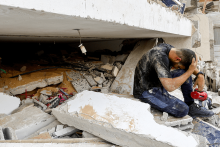
“They will not hurt or destroy on all my holy mountain...” —Isaiah 11:9
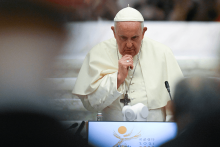
Pope Francis called for an end to attacks and violence in Israel and Gaza on Sunday, saying terrorism and war would not solve any problems, but only bring further suffering and death to innocent people.

IN LATE MARCH, when Far Right former Brazilian president Jair Bolsonaro returned from self-imposed exile, supporters greeted him with chants of “God, family, and liberty,” harkening back to the motto of the dictatorship that ruled Brazil from 1964 to 1985. Overwhelming political support from evangelical Christians — similar to that received by Donald Trump — had swept Bolsonaro into office in 2018. Both men repaid this support by moving their respective embassies from Tel Aviv to Jerusalem, actions that were long sought by conservative Christians in the West, signaling a rejection of Palestinian aspirations for independence.
Brazil is only one of the countries in Latin America where right-wing evangelical Christians have become a political force. Today, evangelicals constitute about 27 percent of Brazil’s population, compared to about 25 percent in the United States, according to the Pew Research Center. As the number of Latin American evangelicals has soared in recent years, Christian Zionism has also risen as a political and cultural force in the region.
Christian Zionists believe that support for the modern secular state of Israel is a scriptural obligation with theological ramifications for the “end times.” Too often Christian Zionists defend Israel while perpetuating Christian supremacy and antisemitism; they remain ignorant of the persecution of Jews throughout history. Adopting uncritical, religiously motivated support for the secular state of Israel, Christian Zionists provide cover for Israel’s internationally recognized human rights abuses against Palestinians. The embrace of Christian Zionism threatens to be as damaging to marginalized communities in Latin America as it has been to Palestinians.

WHEN BSHARA NASSAR moved to the United States in 2011, he quickly noticed that something was missing. “There was no place for our story to be told,” said Nassar, a Palestinian Christian born in Jerusalem and raised in Bethlehem. (“My family has been Christian for 2,000 years,” Nassar told Sojourners. “We didn’t convert — the faith was born here!”) But he felt the story of the Palestinian people “was always being distorted or minimized — it was always about either ‘victims’ or ‘violence.’” So, in 2015, Nassar started visiting universities, churches, and community centers with a “traveling exhibit” of only two pieces, focused on refugees from Palestine. “It took a while to build momentum,” Nassar said.
Nassar is now director of the Museum of the Palestinian People, situated in a rowhouse near Dupont Circle in Washington, D.C. Through the museum, Nassar said, “We want to share our story from our perspective — who we are, where we come from. For too long our stories have been told by others, who portray us in often negative stereotypes. We want to share with the world who Palestinians truly are.”
The museum’s latest exhibition focuses on tatreez, the art of Palestinian embroidery, and looks at the role of “material culture and art history in preserving a nation’s identity,” according to exhibit curator Wafa Ghnaim. For Ghnaim, the first Palestinian embroidery instructor at the Smithsonian Museum and now a senior research fellow for the Metropolitan Museum of Art, the exhibit is about addressing the question, “How do we reclaim our heritage?” The exhibit includes embroidered dresses from before and after 1948—the year of what Palestinians call the Nakba, or catastrophe, when according to the Institute for Palestine Studies, two-thirds of the Palestinian population was uprooted as the State of Israel was created. “The dresses created before 1948 reflect a village identity,” Ghnaim, an expert in Palestinian traditional dress, told Sojourners, “while dresses created after 1948 reflect a national identity.”

When I opened Shane Claiborne’s new book, I rolled my eyes and sighed. Claiborne’s book, Rethinking Life: Embracing the Sacredness of Every Person, was dedicated to “all the women of faith over the centuries, the midwives of a better world, and to the two most significant women in my life—my mom, Patricia, and my wife, Katie Jo.”
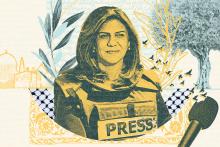
PALESTINIAN AMERICAN JOURNALIST Shireen Abu Akleh was shot and killed in May 2022 while covering an Israel Defense Forces raid on a refugee camp in the Palestinian West Bank village of Jenin. Abu Akleh had been standing with a group of other journalists and was wearing a blue vest with the word PRESS printed across it when she was shot; her producer was shot in the back but survived. Hours after Abu Akleh’s death, Israeli police went into her home, took away Palestinian flags, and prevented the singing of Palestinian nationalist songs.
In mid-November, the FBI opened an investigation into Abu Akleh’s death; Israeli Defense Minister Benny Gantz said Israel would refuse to cooperate since, Gantz said, the IDF had already investigated the IDF actions in the shooting. The U.S. State Department commented, “Not only was Shireen an American citizen, she was a fearless reporter whose journalism and pursuit of truth earned her the respect of audiences around the world.”
Before her death, households throughout the Arab world knew Abu Akleh’s work. Nicknamed “the daughter of Palestine” — and “the voice of Palestine” — Abu Akleh had worked for Qatar-based news outlet Al Jazeera for a quarter century. Viewed as courageous and thoughtful, Abu Akleh inspired many, including women interested in pursuing a career in journalism in the Middle East. A common signoff for her broadcasts summarized her motivation for being a journalist: “I chose journalism to be close to people. It might not be easy to change the reality, but at least I can bring their voices to the world. I am Shireen Abu Akleh.”
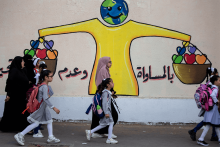
I was amazed at the grassroots leaders, mainly women, working to deliver that desperately needed good news to their communities. Their witness was particularly poignant given the patriarchal context in which they worked. Many of the government officials we met with were men who seemed focused on who would get what in the region’s future; the women we met were empowering people in their communities to create change.
